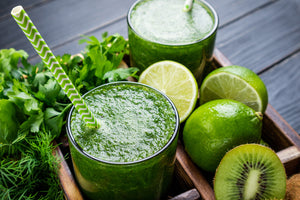Astaxanthin -- The Eyes Have It

We live in a digital age where media and screens permeate our society and command our attention. Schools, homes, vehicles and even grocery stores sport screens and interactive technology. Where television once held a unique niche, it is now shared by computers, tablets, electronic books, video games, GPS systems and, in more recent years, smartphones. The average youth spends approximately 7.5 hours each day using entertainment media, but even that seems conservative if you calculate the amount of time youths and adults spend staring at smartphones each day. In addition to the various psychological and social consequences of unbalanced screen time, the electromagnetic radiation from screens has been shown to damage both the cornea and retina of the eye.
Damage resulting from an excessive amount of screen time is caused by the electromagnetic radiation emitted from electronic screens. This radiation increases the amount of damaging free radicals within the eye itself. In response, the body gears up its antioxidant defense system and sends antioxidants to the area where the damage is occurring. Studies have found that regular PC users have lower levels of antioxidant defense systems, indicating these important antioxidants are getting “used up” as they destroy free radicals in an attempt to protect the eyes. PC users aren’t the only victims of this phenomenon. A similar study found the same process occurring among mobile phone users. As overall screen time increases, so do the levels of destructive free radicals, making it necessary to support antioxidant defense systems and protect the eyes from long-term damage.
Nutrition Support
Fortunately, certain nutrients found in nature are able to support the antioxidant defense systems that work to protect our eyes from screen damage. Astaxanthin is one such nutrient that strongly supports eye health. Like the eye, astaxanthin is lipid-soluble; meaning it easily integrates into fat-laden tissues such as the eye. It is classified as a carotenoid, a group of fat-soluble pigments, which not only give red fruits and vegetables their brilliant color, but also play an important role in eye health. Astaxanthin is a particularly powerful carotenoid that can support the eye and the antioxidant defense systems that work to fight against damaging free radicals.
Although all carotenoids are known for their powerful antioxidant abilities, astaxanthin has been shown to be among the most powerful in its class. One of its secrets for superior eye support is its unique ability to cross the blood brain/eye barrier. This unique barrier is not easily penetrable by all nutrients, since its primary function is to protect these vital organs from foreign substances. However, astaxanthin easily passes through and accumulates quickly to begin its extraordinary work supporting the eye and helping to prevent against further damage.
Astaxanthin is found naturally in many varieties of marine life including algae, plankton, krill and seafood. It is commonly harvested from a specific species of algae known as Haematococcus pluvialis and is responsible for the red pigment naturally found in lobster, crab, shrimp and salmon.
As society becomes increasingly technologically dependent, the subsequent damage to our eyes becomes unavoidable. Therefore, it is more important than ever to make sure that our eyes are well supported with powerful antioxidants such as astaxanthin, the king of the carotenoids.
- David Brady







Comments 0